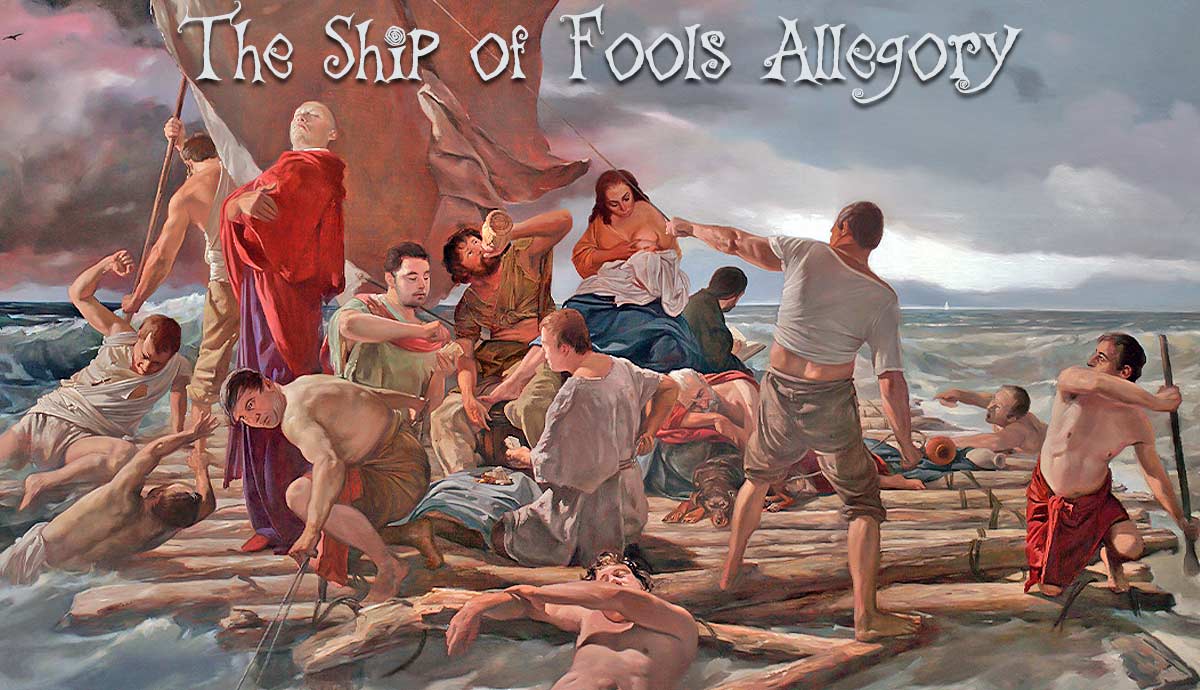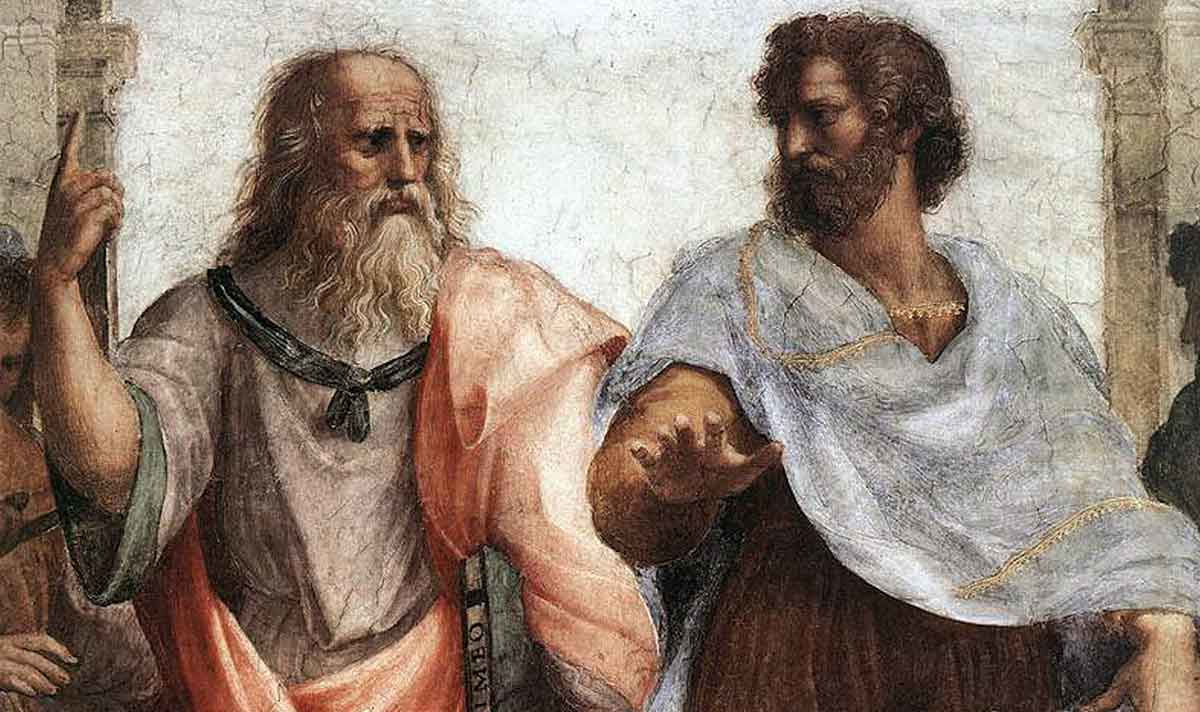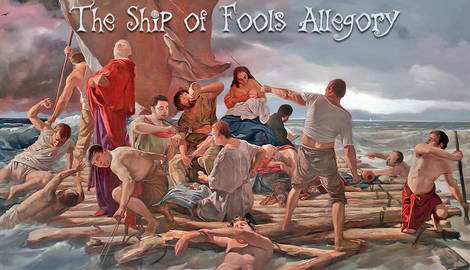
Summary
- Plato’s Ship of Fools allegory argues that when unqualified, self-interested people fight for control, the “ship of state” is mismanaged, wasting resources and endangering everyone on board.
- For Plato, only highly educated rulers who grasp reality beyond appearances (the Forms) can govern well; this view is deeply skeptical of democracy.
- The article’s final section critically examines Plato to wonder whether modern voters need to be experts.
What does it take to wield political authority effectively? Plato turns to the Ship of Fools to explore this question. The allegory illustrates his concerns about unqualified leadership and the dangers of democratic decision-making. This article outlines the allegory, situates it within Plato’s broader political theory, and considers several major objections to his view.
Plato’s Ship of Fools Allegory

The Ship of Fools is an allegory from Plato’s most famous dialogue, The Republic. In The Republic, Plato attempts to describe his ideal city and explain some of the values that inform it.
The allegory goes as follows. Plato asks us to imagine a ship in which each crew member continually vies for the helm. The captain is himself not very good as a pilot. Loyalty among the mutinous crew is determined solely in terms of self-interest. When the crew takes command of the ship, they use up supplies and fail to practice the most basic elements of good seamanship. The allegory ends with Plato observing that, on such a ship, a person who was not focused on his own personal gain would be seen as perverse and feckless by his crewmates.
The Ship of Fools encapsulates some of the central presuppositions Plato makes in constructing his theory of politics. It exemplifies the basic urges which, according to Plato, overwhelm those states in which the masses (or even a limited subset thereof) are given too great an opportunity to exert influence on affairs of state. It is a powerful yet debatable defense of the value of expertise as set against one’s talent for acquiring power as a mark of competent leadership.
Plato’s Critique of Democracy

Plato’s theory of politics sees the state as intrinsically linked to the construction of society. Notably, Plato was not a democrat. In fact, he believed that Athenian democracy was dysfunctional. However, it is worth emphasizing how Plato’s thought can apply to democratic politics.
Few, if any, modern democratic states function solely with elected officials. In most Western countries, there are more unelected civil servants, chosen for their expertise, than elected politicians. Indeed, the emphasis on expertise in public office is certainly one of the central elements of Plato’s political theory, which we have adopted thoroughly.
Politics and the Nature of Knowledge

Equally, the right of the state to constitute social environments is far more common than even Plato might have expected. It is now the state that undertakes the education of most children, and regulates everything from best agricultural practices to the repayment of private loans. The bureaucratic architecture of the modern state is as ambitious, baroque, and extensive as Plato might have wished for.
None of this is to say that Plato’s vision is not at odds with Western, liberal-democratic politics. Constitutional democracies are often bound to use the state to protect various individual rights and liberties. The state’s power is used against itself. Undoubtedly, the present system of government in China more keenly reflects Plato’s vision of good government. Few would argue that the differences between the Western and Chinese models are superficial or minimal.
The Republic is where Plato’s theory of government is elaborated. It is also where we find one of the most extensive treatments of his Theory of the Forms, which attempts to characterize reality itself and how we can come to know it. This theory stresses a strict separation between how things appear and how they really are. Moreover, it holds that the ability to appreciate and understand things as they really are requires philosophical expertise. It is not possible to simply intuit how things are.
The Education Needed for Good Leadership

By the same token, it is not possible for the uneducated or the poorly prepared to make good political decisions. Indeed, some degree of education won’t be sufficient. The kind of education Plato thinks is necessary in order for one to demonstrate good political judgment is highly selective. This is also an argument against democracy. Why allow those with a weak grasp of political reality any political authority?
There are many plausible objections to Plato. One can simply deny that the most effective government is of necessity what we should desire above all others. Equally, it is possible to suggest that Plato has misconstrued the skills required to govern effectively. Expertise as such matters very little when it is wielded by those motivated by self-interest or malice rather than a sense of civic duty.
Yet at the same time, it is far from clear that democracies are especially good at preventing such figures from entering office. Indeed, Plato might reply, without the requisite understanding of political issues, how is one to identify self-interest or malice correctly? It seems that one is bound to hold that the relevant political understanding—at least that required of the voter—is not, contra Plato, extremely sophisticated.
The Limits of Democratic Decision-Making According to Plato

Perhaps this general claim could be made more specific and elaborated as follows. For any one person to know exactly how the state should be run would require extensive education, training, and specialist knowledge. Few people can claim such expertise.
However, what we are asking of a voter, or one who participates in the political process without actually acquiring a position of responsibility, is far less ambitious. In fact, one might argue that what we want from a voter above all is not their judgment on political matters from a neutral perspective, but their perspective. That is, we might think of democracy as an invaluable process of aggregating information. Perhaps all we are really asking is for people to make a judgment about whether or not their lives have improved since the last time they were asked.
There are, of course, a number of straightforward objections both to this as a way of conceptualizing the value of democracy and to the value of this information outright. For instance, we might argue that this information represents only a snapshot of a dynamic system and is, therefore, almost intrinsically misrepresentative. If we agree with Plato’s characterization of the nature of the uneducated masses in the Ship of Fools allegory, we might similarly suspect that the answer people will give to the question of whether or not their lives have improved will be determined on petty criteria, rather than a more holistic or sophisticated sense of what constitutes improvement.
What the Ship of Fools Teaches About Political Expertise

The defense of democracy given above does not represent all that matters about democracy. However, it does help explain what is wrong with the conception of political knowledge implied by the Ship of Fools allegory.
Perhaps the model we should draw on instead is more collaborative, akin to how scientists do their work rather than how a philosopher does his. That isn’t to say a more “scientific” approach to government is what’s needed in other contexts, but it is to suggest that Plato’s emphasis on the ideal ruler elides the question of whether political leadership is, by necessity, a solitary endeavor.










